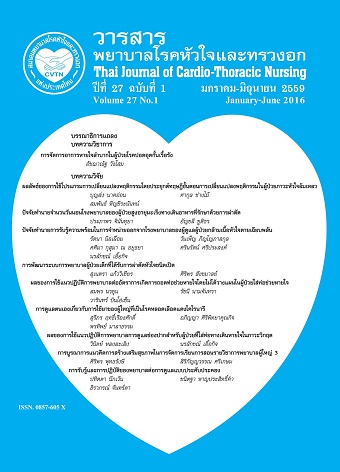ปัจจัยทำนายจำนวนวันนอนโรงพยาบาลของผู้ป่วยสูงอายุมะเร็งทางเดินอาหาร ที่รักษาด้วยการผ่าตัด
Keywords:
จำนวนวันนอนโรงพยาบาล, ความเสี่ยงต่อภาวะทุพโภชนาการ, ผู้ป่วยสูงอายุที่ทำผ่าตัด, มะเร็งทางเดินอาหาร, length of hospital stay, nutritional risks, older patients undergoing surgery, gastrointestinal cancerAbstract
การศึกษาวิจัยนี้เป็นการวิจัยเชิงบรรยาย เพื่อศึกษาความสามารถการทำนายของอายุ ความเสี่ยงต่อภาวะทุพโภชนาการ ภาวะแทรกซ้อนหลังทำผ่าตัด และระดับอัลบูมินในเลือด ต่อจำนวนวันนอนโรงพยาบาลของผู้ป่วยสูงอายุมะเร็งทางเดินอาหารที่รักษาด้วยการผ่าตัด กลุ่มตัวอย่างได้รับการคัดเลือกแบบเจาะจง จำนวน 81 ราย มีอายุตั้งแต่ 60 ปีขึ้นไป เข้ารับการรักษาด้วยการผ่าตัดมะเร็งทางเดินอาหารที่แผนกศัลยกรรมโรงพยาบาลศูนย์ตติยภูมิเฉพาะทาง ขั้นตอนการเก็บรวบรวมข้อมูลมีดังนี้ ประเมินความเสี่ยงต่อภาวะทุพโภชนาการโดยใช้แบบคัดกรองภาวะทุพโภชนาการ ระดับอัลบูมินระยะก่อนผ่าตัด ภาวะแทรกซ้อนระยะหลังผ่าตัด และจำนวนวันนอนโรงพยาบาล วิเคราะห์ข้อมูลโดยใช้สถิติเชิงบรรยาย และสถิติถดถอยพหุคูณด้วยวิธีการเลือกตัวแปรแบบ คัดเลือกเข้า
ผลการศึกษาพบว่า ผู้ป่วยสูงอายุนอนโรงพยาบาลนาน 5 ถึง 93 วัน ค่ามัธยฐานและค่าเฉลี่ยจำนวนวันนอนโรงพยาบาลของกลุ่มตัวอย่างเท่ากับ 20 วัน และ 26.58 วัน ตามลำดับ ปัจจัยอายุ ความเสี่ยงต่อภาวะทุพโภชนาการ ภาวะแทรกซ้อนหลังทำผ่าตัด และระดับอัลบูมินในเลือด สามารถร่วมกันทำนายจำนวนวันนอนโรงพยาบาลของผู้ป่วยสูงอายุมะเร็งทางเดินอาหารอย่างมีนัยสำคัญทางสถิติถึงร้อยละ 30 โดยปัจจัยภาวะแทรกซ้อนระยะหลังผ่าตัดสามารถทำนายจำนวนวันนอนโรงพยาบาลได้มากที่สุด รองลงมาคือ ปัจจัยความเสี่ยงต่อภาวะทุพโภชนาการ
ข้อเสนอแนะจากงานวิจัยนี้ คือ พยาบาลและทีมสุขภาพควรมีการคัดกรองภาวะทุพโภชนาการระยะก่อนผ่าตัดในผู้ป่วยสูงอายุมะเร็งทางเดินอาหารที่เข้ารับการรักษาทางศัลยกรรม และประเมินภาวะแทรกซ้อนระยะหลังผ่าตัดอย่างต่อเนื่อง เพื่อให้ผู้ป่วยสูงอายุได้รับการดูแลช่วยเหลือที่เหมาะสม ช่วยให้ฟื้นสภาพได้เร็วในระยะหลังผ่าตัด และมีจำนวนวันนอนในโรงพยาบาลลดลง
Factors predicting length of stay in older patients with gastrointestinal cancer undergoing surgery
The objective of this descriptive study was to evaluate the predictive power of age, risk of malnutrition at admission, postoperative complications, and preoperative albumin on length of stay (LOS) of older patients with gastrointestinal cancer undergoing surgery. Purposive sampling was used to recruit a sample of 81 patients, aged 60 years and older, who had been admitted to surgical wards for surgery of the gastrointestinal cancer at a super tertiary care hospital. Data collection included gathering information about a nutritional risk by Malnutrition Screening Tool (MST), the pre-operative serum albumin level, postoperative complications and LOS. The data were analyzed using descriptive statistic, and regression analysis with enter method.
The analysis revealed that the LOS ranged from 5 to 93 days with median of 20 days and mean of 26.58 days, respectively. Age, risk of malnutrition, postoperative complications, and serum albumin could jointly explain 30% of the variance in LOS. Postoperative complications emerged as the strongest predictor of LOS of older patients with gastrointestinal cancer undergoing surgery, followed by their nutrition risks.
The suggestions from this study are that nurses and health care team should perform nutritional risk screening for older patients with gastrointestinal cancer before surgery and monitor postoperative complications continuously. This will enable these patients to receive appropriate care, leading to a fast recovery after surgery and a reduction in the length of hospital stay.
Downloads
How to Cite
Issue
Section
License
บทความนี้ยังไม่เคยตีพิมพ์หรืออยู่ในระหว่างส่งไปตีพิมพ์ในวารสารอื่น ๆ มาก่อน และกองบรรณาธิการขอสงวนสิทธิ์ในการตรวจทาน และแก้ไขต้นฉบับตามเกณฑ์ของวารสาร ในกรณีที่เรื่องของท่านได้ได้รับการตีพิมพ์ในวารสารฉบับนี้ถือว่าเป็น ลิขสิทธิ์ของวารสารพยาบาลโรคหัวใจและทรวงอก






